Postcolonial Literature is generally concerned with the demystification of the repercussions of colonialism with regard to individuals, societies and cultures. Indeed, all of these culminate in the psychological implications colonialism has on colonial subjects. Besides, there has recently been a proliferating trend to evaluate the postcloniality of literary works in terms of their consistency vis-à-vis feminist and ecocritical issues as inextricably integral components of the postcolonial discourse.
In this regard, this paper is concerned with assessing the degree of postcoloniality in Margaret Atwood's Surfacing, Anita Desai's Fire on the Mountain, and Chinua Achebe's Things Fall Apart by perusing their approaches to the colonial psychological traumas, their representation of women within postcolonial systems of patriarchy and their rendering of nature as a "colonial subject". This will be conducted through a meticulous analysis of the main protagonists' thought and behaviour patterns.
Inhaltsverzeichnis (Table of Contents)
- Introduction
- 1. Psychological Colonial Traumas
- 2. The Representation of Colonized Women
- 3. Nature as a "Colonized Subject"
- Conclusion
Zielsetzung und Themenschwerpunkte (Objectives and Key Themes)
This paper analyzes three novels—Margaret Atwood's Surfacing, Anita Desai's Fire on the Mountain, and Chinua Achebe's Things Fall Apart—to explore the multifaceted nature of postcolonial literature. The analysis focuses on how these texts represent the psychological impact of colonialism, the portrayal of women within postcolonial contexts, and the relationship between colonization and the environment. The goal is to determine the extent to which each novel embodies the characteristics of postcolonial literature and to identify any limitations in their postcolonial perspectives.
- Psychological impact of colonialism (paranoia, alienation, identity loss)
- Representation of women in postcolonial societies
- The relationship between colonization and nature
- Limitations of postcolonial thought in literature
- The manifestation of neo-colonialism and its effects
Zusammenfassung der Kapitel (Chapter Summaries)
Introduction: This introductory chapter establishes the framework for analyzing postcolonial literature. It defines postcoloniality, highlighting key psychological states (paranoia, alienation, identity loss) often experienced by colonized subjects. It also introduces the broader themes of postcolonial feminism and ecocriticism, demonstrating how women and nature are similarly marginalized within these contexts. The chapter concludes by outlining the study's focus on Atwood's Surfacing, Desai's Fire on the Mountain, and Achebe's Things Fall Apart, using them as case studies to assess the degree and limitations of postcoloniality in these specific works.
1. Psychological Colonial Traumas: This chapter delves into the psychological consequences of colonialism. Using Frantz Fanon's work as a theoretical foundation, it connects the political aspects of colonization with its impact on individual psyches. The chapter then uses Atwood's Surfacing as an example of neo-colonial trauma, analyzing the protagonist's growing paranoia and aversion towards American cultural imperialism. The analysis shows how this paranoia represents the psychological ramifications of colonization, highlighting the protagonist's feelings of abomination, enmity, and ultimate fear in response to the encroaching American culture. The chapter concludes by discussing the limitations of Atwood’s approach, highlighting a tendency towards Manichaeism and national xenophobia in her portrayal of Americans as inherently destructive.
Schlüsselwörter (Keywords)
Postcolonial literature, psychological trauma, paranoia, alienation, identity loss, representation of women, postcolonial feminism, ecocriticism, colonization, nature, neo-colonialism, cultural imperialism, Margaret Atwood, Surfacing, Anita Desai, Fire on the Mountain, Chinua Achebe, Things Fall Apart, American cultural imperialism, Canadian identity.
Frequently Asked Questions: Analyzing Postcolonial Themes in Atwood, Desai, and Achebe
What is the main focus of this academic paper?
This paper analyzes three novels – Margaret Atwood's Surfacing, Anita Desai's Fire on the Mountain, and Chinua Achebe's Things Fall Apart – to explore the multifaceted nature of postcolonial literature. It examines the psychological impact of colonialism, the portrayal of women in postcolonial contexts, and the relationship between colonization and the environment. The goal is to assess how well each novel embodies postcolonial characteristics and to identify limitations in their postcolonial perspectives.
What are the key themes explored in the analysis?
The key themes include the psychological impact of colonialism (paranoia, alienation, identity loss), the representation of women in postcolonial societies, the relationship between colonization and nature, limitations of postcolonial thought in literature, and the manifestation and effects of neo-colonialism.
Which novels are analyzed in this paper?
The paper analyzes Margaret Atwood's Surfacing, Anita Desai's Fire on the Mountain, and Chinua Achebe's Things Fall Apart as case studies to understand the complexities of postcolonial literature.
What theoretical frameworks are used in the analysis?
The analysis draws upon Frantz Fanon's work to understand the psychological consequences of colonialism, and incorporates perspectives from postcolonial feminism and ecocriticism to examine the marginalization of women and nature in postcolonial contexts.
How does the paper analyze the psychological impact of colonialism?
The paper explores the psychological consequences of colonialism, using Surfacing as an example of neo-colonial trauma. It analyzes the protagonist's paranoia and aversion to American cultural imperialism as a representation of the psychological ramifications of colonization.
What are the limitations of the postcolonial perspectives discussed in the paper?
The paper identifies limitations within the chosen novels' postcolonial perspectives, such as a tendency towards Manichaeism and national xenophobia in Atwood's portrayal of Americans.
What are the key takeaways from the chapter summaries?
The introduction establishes the framework for analyzing postcolonial literature and introduces the key novels. Chapter 1 delves into the psychological consequences of colonialism using Fanon's work and analyzes Atwood's Surfacing. (Further chapter summaries would be included here for a complete FAQ based on the provided text.)
What are the keywords associated with this research?
Keywords include: Postcolonial literature, psychological trauma, paranoia, alienation, identity loss, representation of women, postcolonial feminism, ecocriticism, colonization, nature, neo-colonialism, cultural imperialism, Margaret Atwood, Surfacing, Anita Desai, Fire on the Mountain, Chinua Achebe, Things Fall Apart, American cultural imperialism, Canadian identity.
- Citar trabajo
- Khaoula Chakour (Autor), 2018, The Problematic of the Kaleidoscopic Postcolonial Discourse, Múnich, GRIN Verlag, https://www.grin.com/document/434209



